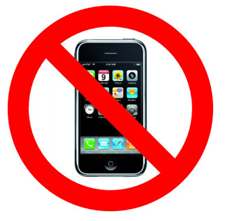June 22, 2015
Ever been running a meeting and noticed that half the participants are reading their Outlook mail on their smartphones? I had the luck of departing the corporate-employment world just as smartphones and laptops were becoming ubiquitous in meetings. But as I teach seminars live inside corporations these days, I see them in constant use and see the negative effect they have in meetings.

Cited about halfway through this New York Times article is an anecdote from a leader in a multibillion dollar products company who required smartphones to be left out of his weekly management meeting. He said when he first started that rule, his employees were like crack addicts, missing their fix. But soon the meetings became vastly more productive. Within weeks, they slashed the length of the meetings by half, he says.
Studies show that multi-tasking is not an efficient activity. Those studies show that any perceived gains in productivity are actually an illusion. That’s why I encourage people to turn off e-mail notification and not constantly stop work activities to read new incoming email when at their desk.
With regard to meetings or seminars I am leading, what I have found is that if I let someone open their laptop in the middle of the presentation to say, check their e-mail, within minutes others who see that start to take theirs out and do the same. The others feel like they have to look productive, or that they may be missing some important news. If I allowed them to do that, however, I found I had to repeat myself to get the training across, and the classes took much longer.
So I ban laptop use in seminars (except during periods of hands-on exercises), and the outcomes are much better. I announce at the beginning that if someone jumps into their laptop during a lecture, I’ll stop the class and wait patiently until I have everyone’s full attention again. It may seem harsh, but it works (peer pressure gets those laptops closed quickly). I also announce that if an emergency comes up, they are free to leave the class.
My point is that you can and should consider holding meetings without smartphones and laptops. I bet you’ll find those meetings are immensely more efficient.
Michael

Smartphones and tablets have spoiled pub quiz competitions as well. I understand one can get a device which kills the mobile signal, maybe by making everyone in the pub log onto a special site.
See http://www.dailymail.co.uk/news/article-2072527/Quizmaster-fed-cheats-creates-Google-proof-pub-quiz.html
and http://www.buzzgold.com/
I wish there could be a discreet mobile phone signal and wifi killer device for use in meetings and workshops, except those that relay on notebooks or tablets to participate in the meeting or workshop.
I like your idea that laptops and smartphones be banned in meetings/courses. But what if they say that they open their laptops just to take notes of the meeting or the course? To insist that they must handwrite their notes on paper may sound a bit too much. Any clever idea to overcome that?
William. Well, I get your point. But I think it is worth taking the grief when the electronic-note-takers complain. Laptops are just so distracting that they are inappropriate for certain types of meetings. And so yes, I think you should do just that: require that if people want to take notes they use paper. Explain the reasoning with confidence and firmness, and they’ll get over it. You can help by having handouts ready, and so on.
Michael
That’s an amazing idea.Ya you are right its distracting if someone in the meeting uses their phone or laptop in the middle of the meeting.I am going to try this in the next meeting and will see how effective the meeting will be.Thanks for the idea.
I completely agree with this approach. Meetings get so much more productive when everyone’s attention is actually on the discussion instead of their screens. I’ve seen it happen myself — once people put away phones and laptops, the energy and focus in the room just changes. It’s similar to how I recently figured out how to contact Starlink https://starlink.pissedconsumer.com/customer-service.html efficiently without going through endless automated menus — focus makes everything smoother.
Despite being a phoneless person for many years (just using google voice on my laptop), still manage to be pathetically block blast/a> non-productive.